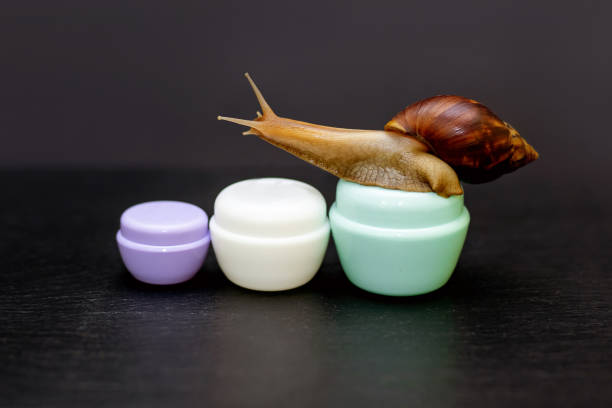Snail mucin, also known as snail slime, has been gaining popularity in the skincare world for its potential to combat acne and other skin issues. This unusual ingredient is extracted from the mucus of snails and contains a combination of glycoproteins, glycolic acid, and other nutrients that may help to soothe and calm the skin. But does snail mucin work for acne, or is it just a slimy fad? In this article, we’ll dive into the science behind snail mucin and explore its potential benefits and drawbacks for acne-prone skin, helping you to decide whether this unconventional ingredient is worth adding to your skincare routine.
Snail Mucin for Acne: Does it Work?
Acne can be a frustrating and persistent skin issue, but what if there was a natural solution to help calm and clear your skin? Snail mucin, also known as snail slime, has been gaining attention for its potential benefits in reducing acne and soothing irritated skin. But does it work? In this article, we’ll dive into the science behind snail mucin and explore its effects on acne-prone skin. Whether you’re looking for a natural alternative to harsh chemicals or want to learn more about this trending ingredient, keep reading to find out if snail mucin is right for you
Read More: Is Shampoo Bad For Curly Hair?
Does Snail Mucin Help with Acne?

Snail mucin, also known as snail slime, has been gaining popularity in skincare due to its potential benefits for acne-prone skin. But does it work? This article will explore the science behind snail mucin and its effects on acne.
Snail mucin is rich in nutrients and antioxidants, including glycoproteins, glycolic acid, and hyaluronic acid. These ingredients have anti-inflammatory and antibacterial properties, which can help reduce redness and kill bacteria that cause acne. Additionally, snail mucin has a thick, gel-like consistency that can help soothe and calm irritated skin.
However, it’s important to note that snail mucin is not a miracle cure for acne. While it may help reduce inflammation and prevent future breakouts, it may not be effective in treating severe acne or acne scars. Using snail mucin in conjunction with other skincare products and treatments is also essential, as it may not be enough to clear up acne completely.
How Snail Mucin Works on Acne

Snail mucin works on acne in several ways. Firstly, its antibacterial properties help kill bacteria that cause acne, preventing future breakouts. Secondly, its anti-inflammatory properties help reduce redness and swelling associated with acne. Finally, its hydrating properties help soothe and calm irritated skin, reducing the appearance of acne scars.
Snail mucin also contains glycolic acid, an alpha-hydroxy acid that helps exfoliate the skin and unclog pores. This can help prevent blackheads and whiteheads from forming, reducing the appearance of acne. Additionally, snail mucin’s hyaluronic acid helps retain moisture in the skin, reducing the appearance of fine lines and wrinkles.
Snail mucin’s antibacterial, anti-inflammatory, and hydrating properties make it a promising ingredient for acne-prone skin. However, more research is needed to understand its effects on acne fully.
Benefits of Using Snail Mucin for Acne

Using snail mucin for acne has several benefits. Firstly, it’s a natural, gentle ingredient on the skin, making it suitable for even sensitive skin types. Secondly, it’s rich in nutrients and antioxidants that can help nourish and protect the skin. Finally, it’s non-comedogenic and won’t clog pores or irritate acne-prone skin.
Snail mucin can also help reduce the appearance of acne scars, fine lines, and wrinkles. Its hydrating properties help plump up the skin, reducing the appearance of imperfections.
Its antibacterial properties can also help prevent future breakouts, reducing the risk of scarring.
Overall, snail mucin is a promising ingredient for acne-prone skin. While more research is needed to fully understand its effects, its natural, gentle, and nourishing properties make it a great addition to any skincare routine.
Further More: Is Jojoba Shampoo Good For Hair
Here is an additional heading:
How to Use Snail Mucin for Acne
Using snail mucin for acne is relatively easy. Here are some tips to get you started:
Snail mucin can be found in various skincare products, including creams, serums, and masks. Look for products that contain at least 20% snail mucin for maximum benefits.
Apply a thin layer of snail mucin cream or serum to your face and neck, avoiding the eye area. Gently massage it in until fully absorbed.
Use snail mucin with other acne treatments, such as benzoyl peroxide or salicylic acid, for best results. This can help enhance its effects and reduce acne faster.
Remember to always patch test snail mucin before using it on your face to ensure you don’t have any sensitivity or allergic reactions.
By following these tips, you can harness the power of snail mucin to help reduce acne and achieve healthier, clearer skin.
Conclusion
Snail mucin is a natural and promising ingredient for acne-prone skin. Its antibacterial, anti-inflammatory, and hydrating properties can help reduce inflammation, prevent future breakouts, and soothe irritated skin. While it may not be a miracle cure for acne, it’s a great addition to any skincare routine. Always patch-test snail mucin before using it on your face, and consult a dermatologist if you have severe acne or acne scars. With its natural and gentle properties, snail mucin is worth considering for those seeking a new solution to their acne.
FAQs
What is snail mucin?
Snail mucin, or snail slime, is a natural substance snails produce to protect their skin and help them move.
How does snail mucin help with acne?
Snail mucin has antibacterial, anti-inflammatory, and hydrating properties that can help reduce inflammation, prevent future breakouts, and soothe irritated skin.
Is snail mucin safe to use on acne-prone skin?
Yes, snail mucin is generally safe to use on acne-prone skin. It’s natural, gentle, and non-comedogenic, which won’t clog pores.
Can I use snail mucin in conjunction with other acne treatments?
Sail mucin can be used with other acne treatments, such as benzoyl peroxide or salicylic acid, to enhance its effects and reduce acne faster.
Where can I find snail mucin products?
Snail mucin products can be found online or in-store at various skincare retailers. Look for products that contain at least 20% snail mucin for maximum benefits.

